

Anxiety is also referred to emotional states such as doubt, boredom, mental conflict, disappointment, and bashfulness.
How To Deal With Anxiety: 5 Coping Skills and Worksheets. At some point, each of us will experience anxiety and stress.
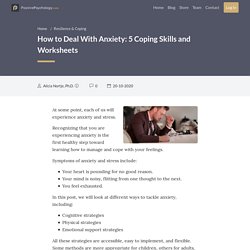
Recognizing that you are experiencing anxiety is the first healthy step toward learning how to manage and cope with your feelings. Symptoms of anxiety and stress include: Your heart is pounding for no good reason.Your mind is noisy, flitting from one thought to the next.You feel exhausted. A guide to coping with anxiety and fear effectively. Reality can sometimes be scary.
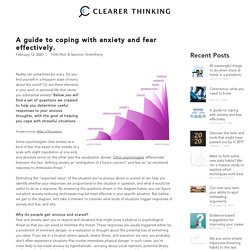
Do you find yourself in a frequent state of worry about the world? Or are there elements in your work or personal life that cause you substantial anxiety? Below you will find a set of questions we created to help you determine useful responses to your anxious thoughts, with the goal of helping you cope with stressful situations. Image source: Atlas of Emotions Some psychologists class anxiety as a kind of fear that exists in the middle of a scale with slight trepidation at one end, and absolute terror on the other (see the visualization above). Estimating the “expected value” of the situation you’re anxious about or scared of can help you identify whether your responses are proportional to the situation in question, and what it would be useful to do as a response.
Why do people get anxious and scared? A Fun but Effective Psychological Trick for Managing Anxiety. Source: AdobeStock Whether public speaking makes you weak in the knees or the thought of stepping foot on a plane turns your stomach, everyone experiences anxiety about something.
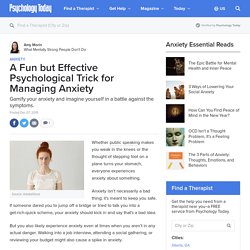
Anxiety isn’t necessarily a bad thing; it’s meant to keep you safe. If someone dared you to jump off a bridge or tried to talk you into a get-rich-quick scheme, your anxiety should kick in and say that’s a bad idea. article continues after advertisement But you also likely experience anxiety even at times when you aren’t in any actual danger. The Most Powerful Way to Release Worry and Anxiety - The Post-Grad Survival Guide - Medium. Anxiety vs. Fear. Fear and anxiety are closely related.
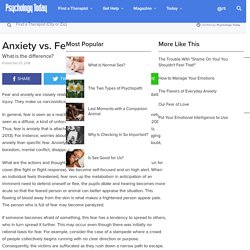
Both contain the idea of a danger or possibility of injury. They make us narcissistically preoccupied with ourselves. In general, fear is seen as a reaction to a specific, observable danger, while anxiety is seen as a diffuse, a kind of unfocused, objectless, future-oriented fear (Barlow, 2002). Status Anxiety. The 8 Most Unexpected Advantages of Anxiety. Anxiety can be crippling, but psychology studies find it does have some unexpected upsides.
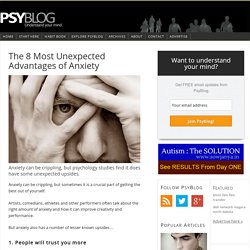
Anxiety can be crippling, but sometimes it is a crucial part of getting the best out of yourself. Artists, comedians, athletes and other performers often talk about the right amount of anxiety and how it can improve creativity and performance. But anxiety also has a number of lesser known upsides… Anxiety: 10 New Psychology Studies You Should Know. New ways to reduce anxiety, why some people are so anxious and more… Ten new psychology studies reveal why some people are anxious, how to reduce anxiety and much more.
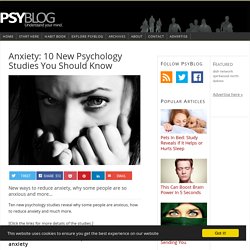
[Click the links for more details of the studies.] 1. Acts of kindness can help reduce social anxiety Performing acts of kindness can help people with social anxiety mingle with others more easily. People recruited into the study were put into one of three groups for four weeks: One group performed acts of kindness, like doing their roommates’ dishes.Another group were exposed to various social interactions without the acts of kindness.A third group, who did nothing special, acted as a control. At the end of the study it was those who’d performed the acts of kindness who felt more comfortable in social interactions. 2. Dietary supplements which contain passionflower, kava or combinations of L-lysine and L-arginine can help reduce anxiety, according to a review published in the Nutrition Journal. 3. 4.
Can't Do It Perfectly? Just Do It, Badly! The Neuroscience of Proactive vs. Hyper-Reactive Thinking. Feeling Insecure. Learned Helplessness. Test Anxiety. Procrastinating. Stress Factors.
Imagination. Anxiety Disorder. How to Be Anxious. Create less.
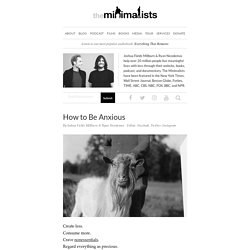
Consume more. Crave nonessentials. Regard everything as precious. Refuse to let go. Stare at the rearview. How to cope with anxiety [ TEDx : Olivia Remes ] 5 Ways Of Coping With Your Anxiety That Are Actually Making It Worse. 5 ways of coping with anxiety that can actually make it worse… check out the full list below along with some helpful alternatives for coping with anxiety.
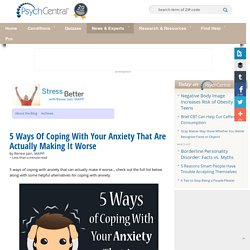
This infographic was created in partnership between Megan Bruneau, M.A. RC and GoZen! Remedies for Your Anxious Mind. On a bad day—and those can come one after another—every little thing can drive us to distraction.
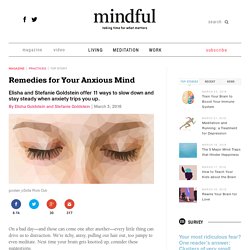
We’re itchy, antsy, pulling our hair out, too jumpy to even meditate. Next time your brain gets knotted up, consider these suggestions. 5 More Ways to be Kind to Yourself When You’re Anxious. So many of us judge ourselves for being anxious.
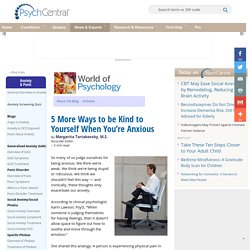
We think we’re weak. We think we’re being stupid or ridiculous. We think we shouldn’t feel this way — and ironically, these thoughts only exacerbate our anxiety. According to clinical psychologist Karin Lawson, PsyD, “When someone is judging themselves for having feelings, then it doesn’t allow space to figure out how to soothe and move through the emotion.”
She shared this analogy: A person is experiencing physical pain in her arm. Yet it’s understandable that we get like this when our anxiety peaks. That is, we sweat, our heart rate increases and our breathing becomes shallow. “In that hyper-aroused state, it is really difficult to pause and be kind to ourselves.” Four Ways To Tame Your Anxiety. Are you struggling to manage your levels of anxiety at work? As our workplaces become increasingly dynamic, demanding, and complex, it’s hard not to feel anxious. So what can you do to tame your anxiety if it’s undermining your wellbeing and performance at work? “Anxiety is a pathway in your brain connecting past experiences to your cortisol’s on switch that equips you to recognize danger and anticipate threats in the future,” explained Professor Loretta Breuning from California State University when I interviewed her recently.
How To Stop Worrying. Ever feel like you can’t turn your brain off? Worried about how to stop worrying? We all deal with this when life gets challenging. There is a way to overcome worry that doesn’t involve alcohol or a straitjacket. The answer is thousands of years old — but now science is validating those ancient ideas. How to Deal With Stress and Anxiety: 10 Proven Psychological Techniques. Ten techniques you can use to deal with stress that you can’t avoid. The best way to reduce stress is, of course, to identify the source and get rid of it. If only this were possible. Anxiety: Getting Excited Beats Trying to Calm Down. People giving public speeches and taking a stressful maths test did better when they re-thought their performance anxiety.
A study on anxiety-inducing activities like public speaking finds that the intuitive response–consciously trying to calm down–isn’t the best strategy. Instead, people instructed to say to themselves, “I am excited” before a stressful ordeal, performed better. The counter-intuitive finding comes from a series of experiments conducted by Alison Wood Brooks, to be published in the Journal of Experimental Psychology (Brooks, 2013). Forget calming down Everyone knows that anxiety can hurt performance.
Anxiety: What Causes It, How To Deal With It And Lead A Happier Life. This summer, we had a wake-up call. Or rather, we would have had one, if we weren't worrying about the number of things going wrong in our lives, and feeling completely overwhelmed about how to deal with it. Anxiety, we're sorry to say, is here to stay. The Office For National Statistics, said the Guardian, revealed in a far-reaching survey that at some point, one in five Brits suffer from anxiety, depression or both. To get a handle on what anxiety is - from causes to fixes - we ask anxiety expert Rob Kelly who created The Thrive Programme, which helps people get through issues such as weight loss, depression, anxiety, phobias, smoking cessation, panic attacks and negative thinking.
What causes anxiety? 3 Art Therapy Techniques to Deal with Anxiety. Aromatherapy Alleviates Anxiety Via Your Vagus Nerve. 15 Anxiety Workbooks and Worksheets for Teens, Kids, & Adults (PDF)
Podcasts. Regulate Anxiety. Kid Anxiety. Eating Disorder. Self-Talk.